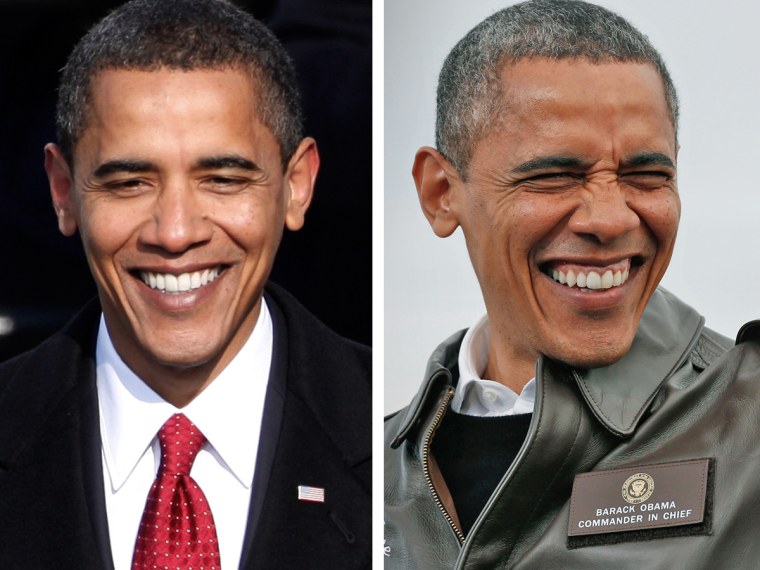President Barack Obama went gray during his first term in office. But, internally at least, presidents don’t age any faster than other Americans – and, in fact, historically surpass average U.S. lifespans, according to a study into whether commander in chief is, literally, is a killer job.
“Is there anything bad for your health about being president? I can’t think of a thing,” said sociologist Jay Olshansky, who last year exposed the myth of accelerated presidential aging in a paper published by the Journal of the American Medical Association.
“You have to be able to withstand the rigors of stress, of course, to become president. I think that’s why stress isn’t much of an issue for them,” said Olshanksy, a professor of public health at the University of Illinois at Chicago. “I’m guessing the stress they experience is actually beneficial – except for their hair.”
Photos of presidents prior to taking office and after departing seem to offer stunning comparative evidence of the weight of the world’s most powerful position. Think: a deeply furrowed Abraham Lincoln, a baggy-eyed Jimmy Carter and snowy-locked Bill Clinton during their final days in power.
Stressed? Way. Enough to kill? No, not according to Olshansky’s research – not, at least, due to their workload or the enormous responsibilities they lugged for years.
Olshansky used the birthdays, inauguration dates and death years of each POTUS to determine that two-thirds (68 percent) of the men who have toiled in the Oval Office lived longer than the expected lifespans of their era – not including those who were assassinated.
Consider America’s founding fathers: the first eight presidents spent an average of 79.8 years above ground, he said. That even beats the average lifespan for today’s U.S. males – 76.2 years.
“This myth that presidents age twice as fast as anyone else was purely based on how they looked, not on any data. You might age faster (outwardly), but you do not die any sooner,” said Dr. Robert Shmerling, clinical chief of rheumatology at Beth Israel Deaconess Medical Center in Boston. He reviewed Olshansky’s study for a column he writes on medical myths.
Added Olshansky: “The normal reaction of the body to stress is an accelerated graying of the hair and wrinkling of the skin. But that doesn’t mean all the other facets of aging are accelerated.”
So, while the presidents wear their jobs on their faces, they don’t necessarily have higher risks of heart disease or cancer, Olshanksy said. (And let’s not forget that they generally enjoy access to the nation’s best physicians.)
Still, chronic tension and long hours – plus wars, scandals and head-splitting national dilemmas – have long been suspected of taking a toll on the men who have run the country. It’s logical to assume such a physical cost when big anxieties typically harm other people. Plus – we thought – we had all the before-and-after pictures necessary to prove this theory.
Turns out, though, presidents tend to be the types of guys who “thrive on stress,” Shermling said, adding that the office surely attracts such men. He bases his supposition, in part, on the collective longevity of the White House winners.
So, for people who seek adrenaline-jammed moments (or years packed with drama), might their psychological composition counteract the otherwise-damaging effects of high stress?
“I think it can,” Shmerling said. “Stress is such an easy thing to blame. But there are people whose blood pressure and heart rate actually fall, compared to others, when they’re placed in similarly stressful situations. Where some people are debilitated by stress, some aren’t even fazed by it," he added.
“Certainly these are people with healthy egos who go into (national politics), who do well with stress in general. I don’t really think it’s a threat to their health.”
So stop fretting about Obama’s gray hair.
But what about the presidential candidates who fall short in the vote count? What about Mitt Romney? Should the Republican nominee also expect a long and healthy future despite his failure to carry Ohio and Florida?
“Somebody suggested to me a long time ago: Why don’t you see what happens to the losers?” Olshansky said. “I haven’t checked that out yet so I don’t know the answer. It would be interesting to see, wouldn’t it?”
More men's health stories from NBCNews.com:
Middle-aged men have higher suicide risk
